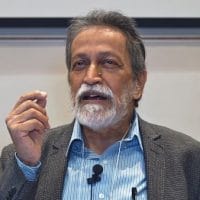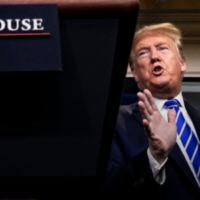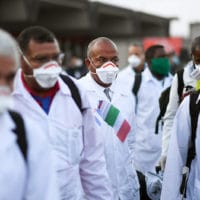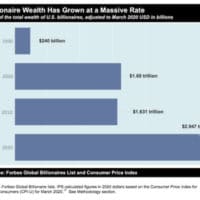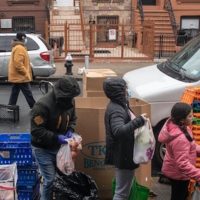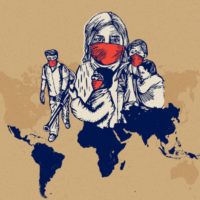-
The exodus of finance from the third world
There is an exodus of finance from the third world at present, far exceeding in scale what had occurred in 2008 after the financial crisis.
-
Carnivals of the damned: the U.S. far-right fights the lockdown
The wave of far-right anti-lockdown protests show how capitalist politics can create monsters. Worse might be on the way.
-
Globalisation and the pandemic
SSER-IDEAS Online Lecture Series — COVID-19 Pandemic: Policy Failures and Their Impact on the Lives of People
-
Both sides-ing bleach injection
Media in the era of an incompetent president.
-
America’s super-rich see their wealth rise by $282 Billion in three weeks of pandemic
America’s billionaires have accrued more wealth in the past three weeks alone than they made in total prior to 1980.
-
Corporate planning in the coronavirus economy
In this blog post, I want to connect what we’re currently seeing in the retail sector during this pandemic to deep-seated narratives about the nature of economic exchange, in particular to the notion of “the market”.
-
How to explain climate change? With comic books
If you are reading this, you probably already know a lot about climate change. But what images come to mind if I asked you to visualize climate change?
-
Declaring victory too soon: Lessons from Europe’s different responses to coronavirus
But do these assumptions hold up to the test? To find out, we must first take a quick look at some recent history.
-
COVID-19 crisis: Bolivia’s movement towards socialism says #PutLivesFirst
Given the exponentially rising death toll from COVID-19 and the devastating social and economic effects of brutal lockdowns, what could a humane and progressive response to the global pandemic look like?
-
Leftword Books Editor Vijay Prashad on Life and Legacy of Italian Marxist Com. Antonio Gramsci
Leftword Books Editor Vijay Prashad on Life and Legacy of Italian Marxist Com. Antonio #Gramsci. #Bennito #Mussolini’s court stated, “For twenty years we must stop this brain from functioning” during the trail of Com Gramsci.
-
During Coronvrius: Cuba to the rescue, but don’t tell the American people
Anti-Cuba zealots in the Trump administration have been enticing Cuban doctors working overseas to defect, paying journalists to write negative stories, slapping sanctions on Cubans in charge of the program, and strong-arming countries to expel Cuban doctors.
-
How the poor die in New York
Van Dyke I is a series of 22 hulking brick apartment blocks in Brownsville, the poorest part of Brooklyn, New York. At least 10 people have died there from COVID-19, including a mother and son whose bodies were discovered only after neighbours reported the smell to city officials.
-
Chart of the day
A new report from the Institute for Policy Studies, “Billionaire Bonanza 2020: Wealth Windfalls, Tumbling Taxes, and Pandemic Profiteers,” reveals that the wealth of U.S. billionaires is indeed staying at home.
-
The Black Plague
The rapidity with which the pandemic has consumed black communities provides an unvarnished look into the dynamics of race and class that existed long before it emerged.
-
It is not just propaganda: What the U.S. anti-China campaign is looking for
The Trump Administration has spread the conspiracy theory that the new coronavirus came out of the Wuhan Institute of Virology. This accusation, which seeks to transfer responsibility for the pandemic to the Asian giant, has been rejected by the Chinese authorities for being without foundation.
-
Anarchy // Spoken Word
I got away from all the chains they tried to lock me up with I wasn’t made for nine to fives or working in construction I never fit the system.
-
A history of American protest music: Which Side Are You On?
Just as we were in the 1930s and ’60s, America is suffering a moral crisis. We have to decide which side we are on: hate and exclusion, or justice, inclusion, and democracy?
-
Joe Biden: no lesser, just evil
The only thing Joe Biden and Donald Trump should be battling over is the top bunk of a prison cell. Instead, these two crooks are vying for the presidency of the United States. If Biden is this year’s lesser evil, he is sorely testing the meaning of “lesser”. No Democratic politician has worked longer and harder to turn the U.S. into the nightmare it is today.
-
“Please Don’t”: Doctors forced to speak out as Trump ponders aloud whether injecting disinfectants could treat COVID-19
“ALERT! Please do not ingest, inject, inhale, or otherwise use any disinfectant outside of its labeled instructions. And do not start using tanning beds or sunning without sunscreen.”
-
Coronavirus: the need for a progressive internationalist response
This pandemic health crisis exposes the injustices of the global economic order. It must be a turning point towards creating the systems, structures and policies that can always protect those who are marginalised and allow everyone to live with dignity.



